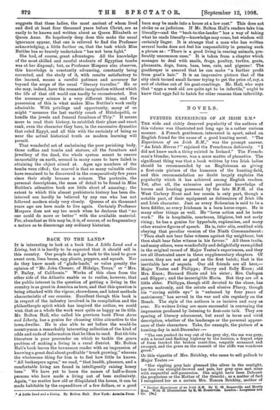BACK TO THE LAND.* IT is interesting to look at
a book like A Little Land and a Living, but it is hardly to be expected that it should sell in this country. Our people do not go back to the land to grow sweet corn, lima beans, egg plants, peppers, and squash. Nor do they know much of "glade-lands," or value greatly the opinion of "Mr. John Closner, of Hidalgo, Texas," or "Mrs. P. Bailey, of California." Works of this class from the other side of the Atlantic enable us to realise, however, that the public interest in the question of getting a living in the country is as great in America as here, and that this question is being attacked with the vigour, shrewdness, and latest methods characteristic of our cousins. Excellent though this book is in respect of the industry involved in its compilation and the philanthropic spirit which has inspired the author, we could wish that as a whole the work were quite as happy as its title. Mr. Bolton Hall, who called his previous book Three Acres and Liberty, has a genius for choosing titles attractive to the town-dweller. He is also able to set before the would-be countryman a remarkably interesting collection of the kind of odds and ends of information that he likes to read. But tit-bits literature is poor provender on which to tackle the grave problem of making a living in a rural district. Mr. Bolton Hall's book leaves the townsman reader with an impression of knowing a great deal about profitable "truck growing," whereas the wholesome thing for him is to feel how little he knows. "All beekeepers agree," we read, "that health, pleasure, and a comfortable living are found in intelligently raising honey bees." We have yet to learn the names of half-a-dozen persons who have made a living out of bees exclusively. Again, "no matter how old or dilapidated the house, it can be made habitable by the expenditure of a few dollars, or a good
.• 4LiUi.LandondaLiving. By Bolton Hall. New York: Arcadia, Press.
barn may be made into a house at a low cost." This does not strike us as judicious. If Mr. Bolton Hall's readers take him literally—and the " back-to-the-lander " has a way of taking what he reads literally—knowledge may come, but wisdom will certainly linger. It is strange that a man who has written several books does not feel his responsibility in penning such a phrase as : "There is a good living in rearing animals, pre- ferably uncommon ones." It is taken from a chapter which manages to deal with snails, frogs, poultry, turtles, goats, pheasants, dogs, foxes, bass, bees, cats, and pigeons ! The goatkeeper is assured that he can make "a further profit from goat's hair." It is an impressive picture that of the city clerk turned small farmer trying to get the price of, say, a suit of clothes out of his goat-combings. Mr. Hall, who says that "eggs a week old are quite apt to be infertile," ought to know that eggs fail to hatch for other reasons than infertility.










































 Previous page
Previous page